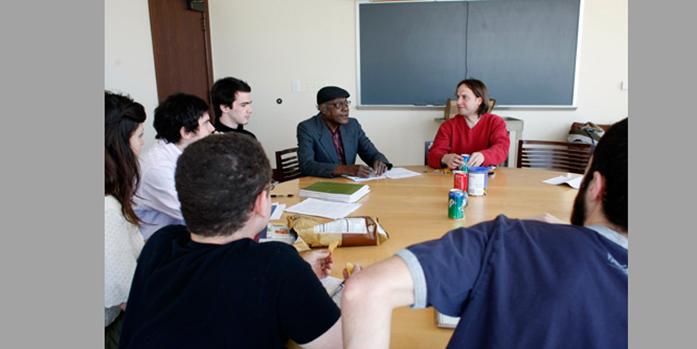By Tessa Solomon
At the Writers’ Workshop Dey House, James Alan McPherson’s study sits untouched, say those familiar with the room. His books — spines creased from continual reading — still line the shelves. On his desk, notebook pages with margins scrawled with pen contain various meanderings or careful annotations. Tangible testaments of an indelible presence.In the days leading up to McPherson’s death on July 27, friends, colleagues, and former students came to his bedside. His daughter, Rachel McPherson, read aloud to him the stream of letters relating far-flung lamentations.
“James Galvin once said Jim was the soul of the Workshop,” said Workshop graduate and UI lecturer Jason England. “You don’t fill that void.”
It doesn’t seem as though the Workshop has any intention of doing so. Instead, it will celebrate his legacy at 4 p.m.Saturday at a memorial in Macbride Hall. Treasured colleagues, including Galvin and Marilynne Robinson, will share their experiences with McPherson, both daily interactions profound in their significance and pivotal points in the brillian career of the winner of the Pulitzer Prize and recipient of a MacArthur “genius grant.”
“We wanted a program in which we can just talk about Jim and read his works, so his legacy could continue on with the last students and so the current students can have the opportunity to learn more about him,” said Lan Samantha Chang, the director of the Workshop.
Chang, among many fortunate few to assemble, was once a student in McPherson’s fiction class.
“He was very brilliant in a gentle and humble way,” Chang said. In one class, now decades ago, she and her classmates argued about the interpretation of a tricky tale written by one of the students about two women living in a cornfield. McPherson listened, in that gentle way now familiar to the students. In the rare space between voices, he offered his thoughts: It reminded him of an Emily Dickinson’s poem “After great pain, a formal feeling comes.”
No formal elements of the poem — setting or even Dickinson’s name — were mentioned in the story. At the end of class, the writer said the poem had been on her mind during the entire writing process.
“He didn’t talk much in class. He said few things, but they were always more profound than we were,” Chang said. “He could see it on a different level.”
“A writer, no matter what the context is made an outsider by the demands of his vocation,” McPherson wrote in his foreword to *The Stories of Breece D’J Pancake*.
“You see the difference between people who have serious life experiences and the younger writers come fresh out of Ivy schools and feel this ego,” said England, who will also speak at the memorial. “That’s something that separated Jim from a lot of others: [his work] was about life.”
Before departing for the Workshop, England was instructed by a mentor, “When you get down there, you find Jim.” In McPherson, he found both a teacher and a friend; he discovered a man who did not indulge in the literary status he had earned.
“You had to look him up to know about what he had done; he didn’t care about that,” England said. “He was just your neighbor.”
McPherson gave gifts. Some were intangible but invaluable, such as his selfless jaywalk across Washington Street, concerned, having spotted a distressed Chang passing outside the Englert. Other gifts could fit in one’s hand, such as the Motown-belting birthday card England will soon frame on his wall.
And now, for those attending the memorial, their time is not given as a gift but a small, incomparable goodness for a legend who never asked.
Remember James McPherson
Where: Macbride Auditorium
When: 4 p.m. Saturday
Cost: Free



